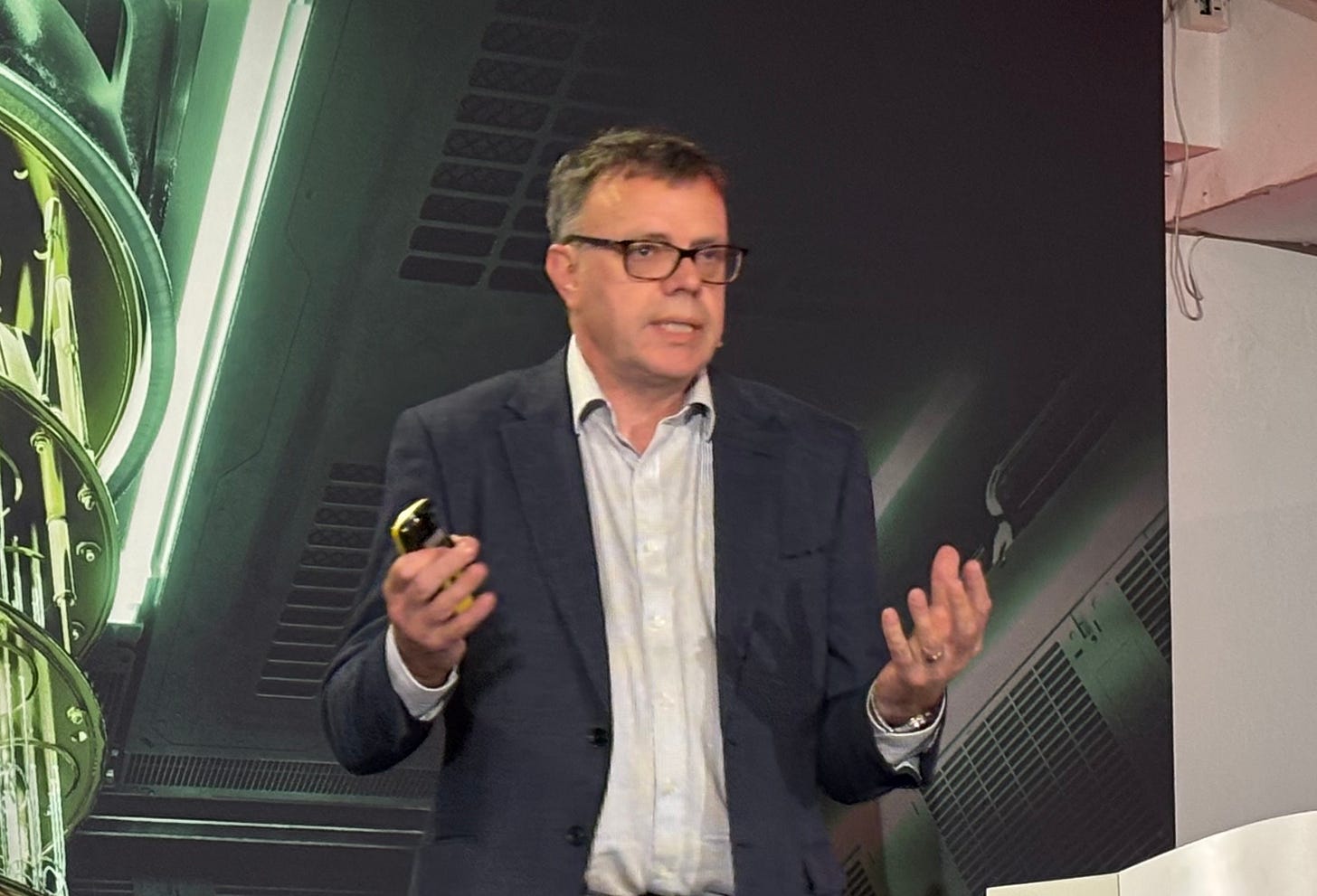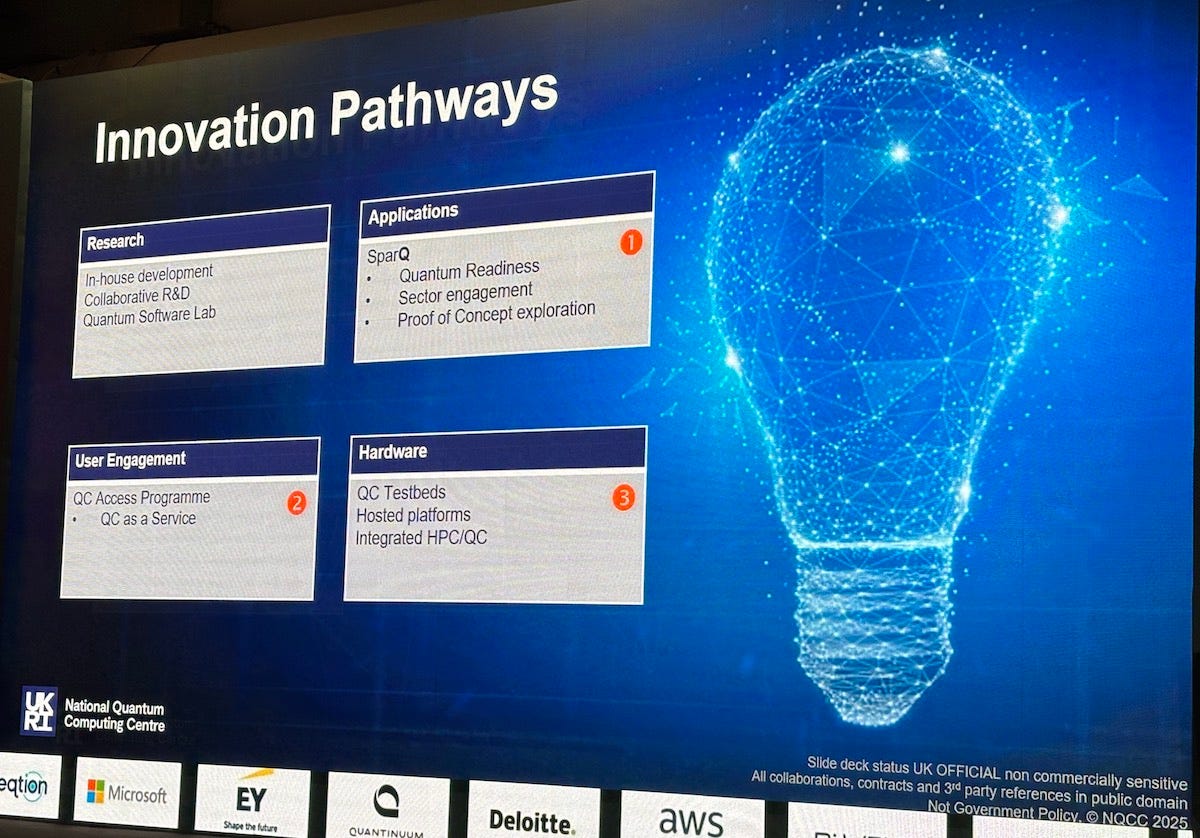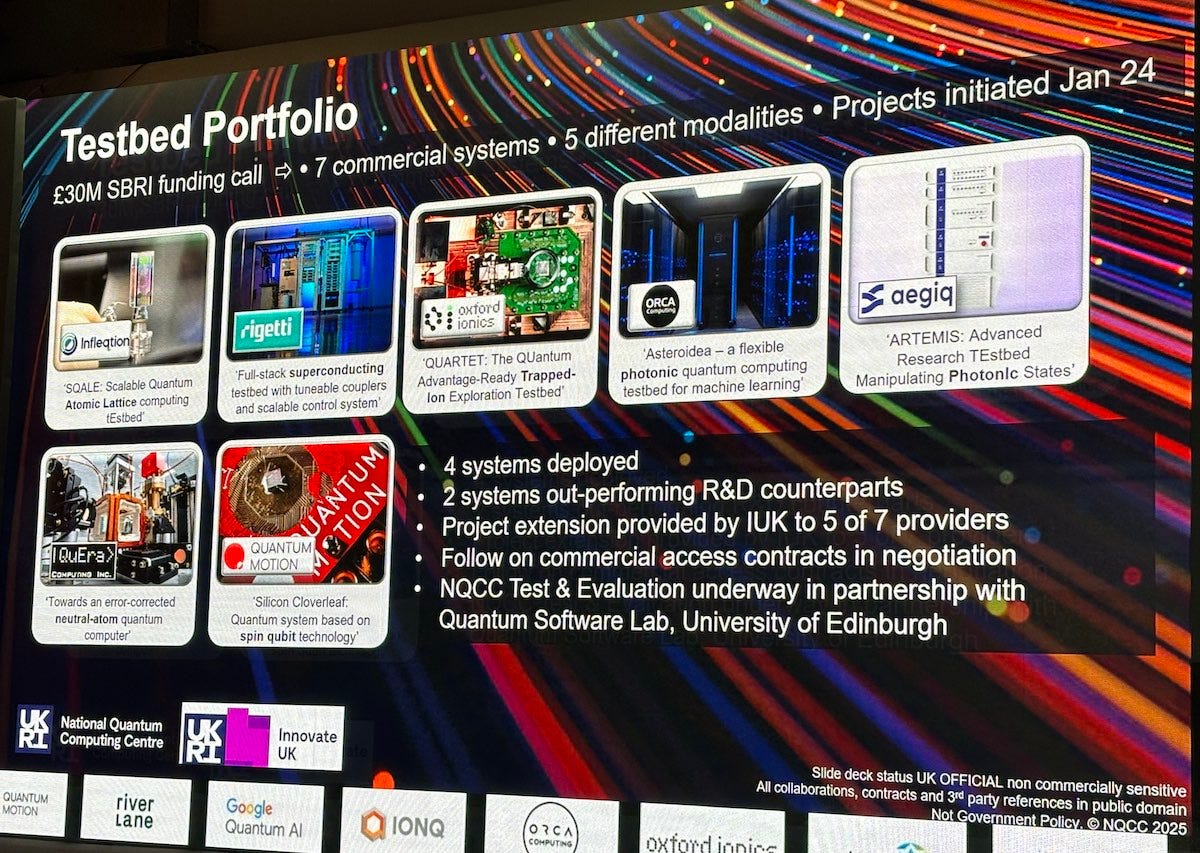Seven Quantum Computers Installed as UK Testbed Enters Evaluation Phase
Britain’s national quantum center begins benchmarking era with seven commercial platforms now deployed
The National Quantum Computing Centre (NQCC) has reached a significant milestone in its mission to build sovereign quantum capabilities in the UK: all seven quantum computing systems announced in February 2024 are now installed at its Oxfordshire facility.
The center has officially entered the next phase of its £30 million testbed program, which involves evaluation, benchmarking, and early-stage application development.
Each of the seven systems represents a different hardware modality, allowing the UK to explore and compare competing quantum architectures. This multi-platform approach is not only strategic but pragmatic, given the field’s rapid technological evolution and the absence of a dominant architecture.
“We’ve been doing a lot of work to drive quantum readiness,” said NQCC Director Michael Cuthbert. “All of this is really in support of the long-term objective for the quantum mission over the next decade—to reach a Terra clock-type machine.”
Two of the systems are already outperforming their counterparts from the previous research lab.
More importantly, the machines are now available to the UK’s academic researchers, industry developers, and government stakeholders for hands-on experimentation and benchmarking. This transition marks a decisive shift from theoretical potential to operational reality.
Collaboration Anchored in Infrastructure
Speaking at Commercializing Quantum Global in London on May 13, Cuthbert outlined how the NQCC was conceived to scale quantum computing not only technologically but socially—by growing a user community and workforce alongside infrastructure.
“One of the watchwords in thinking about what the NQCC should be was collaboration,” he said. “We now have over 25 collaborations with different institutes and entities—on technology, hardware, software, and applications.”
The center currently supports 25 application research projects involving 41 industry partners alongside a suite of education and engagement programs. Nearly 600 professionals have completed training through its online platform, while 60 have participated in certified professional development courses offered by the University of Bristol. The center funds nine PhD students and three early-career research fellows.
The NQCC also maintains a significant outreach mission, having reached more than 6,000 people through public engagement programs that highlight the societal and economic implications of quantum computing.
“All these things add up into creating that workforce that can support quantum for the longer term,” said Cuthbert.
SparQ: From Curiosity to Competence
Central to this workforce strategy is SparQ—the NQCC’s flagship user engagement initiative, designed to support the UK’s journey to quantum readiness. SparQ offers practical pathways for professionals and researchers to transition from basic awareness to technical advocacy, encompassing programming, evaluation, and knowledge exchange.
“The SparQ program was about thinking: how do we get quantum computing in the hands of potential users?” said Cuthbert. “How do we bring best practices together and get people to talk to each other, particularly from disparate industry sectors?”
SparQ targets professionals across defense, finance, energy, and aerospace, facilitating the discovery of quantum use cases through hands-on access and mentorship. By encouraging multidisciplinary conversation, the program highlights shared computational challenges that may be solved using quantum techniques.
Additionally, the Quantum Computing Access Program (QCAP) provides cloud access to quantum machines at no cost to academic and government users.
According to Cuthbert, three main user groups are emerging: the “quantum-curious” seeking educational experience; experienced developers exploring new algorithms and error correction; and classical computing experts looking for novel tools to solve domain-specific problems in chemistry, gravitational physics, or high-energy science.
“These are an interesting new group,” Cuthbert noted. “They just want something new and better to explore these types of problems—it doesn’t necessarily have to be a communications computer. It just needs to be something that works.”
Evaluation Era Begins
With the installation phase complete, the NQCC is now pivoting to a 24-month technical evaluation program. This phase is being run in partnership with Professor Elham Kashefi’s Quantum Software Lab at the University of Edinburgh.
The evaluation program is grounded in a benchmarking framework developed with the National Physical Laboratory (NPL) and other UK-based theorists. This includes performance metrics, noise modeling, error correction, and resource estimation—foundational tools for assessing readiness and long-term viability.
“We had this 15-month period to build and commission the testbeds,” Cuthbert explained. “Now we’ll go through an exercise in evaluating, characterizing, benchmarking, thinking about use cases and application exploration.”
The NQCC is deliberately avoiding a rigid framework for extending vendor contracts. Instead, it is pursuing flexible, tailored follow-on agreements with each of the seven providers.
“Rather than us imposing one-size-fits-all, we want to really have that as flexible as possible,” he said.
Intellectual property (IP) related to the testbed hardware remains with the suppliers, while any new IP developed through the evaluation program will feed into the UK’s wider quantum roadmap.
“We view that the IP needs to be supplier-retained within the hardware,” he added. “Then we drive forward on the IP that comes out from the evaluation program later on.”
The NQCC’s approach also stands in contrast to other international efforts, such as the U.S. Defense Advanced Research Projects Agency’s (DARPA) Quantum Benchmarking Initiative (QBI). While the QBI focuses on reaching utility-scale machines by 2033, the UK’s strategy is to enable operationally useful machines by 2025.
“The objectives are different,” Cuthbert said, “but there’s plenty of room for cooperation and complementarity.”
Building Toward National Impact
As interest in quantum computing deepens across government, the NQCC is seeing new demand from agencies beyond traditional science and defense stakeholders. Expressions of interest in testbed usage have come from the National Health Service, the Department for Transport, and departments overseeing energy and future telecoms.
“These are proposals of differing maturity, but they show a growing appetite for quantum exploration across the public sector,” Cuthbert noted.
The NQCC’s vision extends beyond machines and metrics—it is about anchoring a national ecosystem for quantum innovation. That includes fostering next-generation talent, as reflected in the upcoming UK Quantum Hackathon, scheduled for July 21–23, 2025, in Edinburgh. The event, part of the SparQ program, invites students and early-career researchers to collaborate with industry mentors on practical challenges using real quantum hardware.
“We are looking for real-world problems that can stretch the imagination,” said Cuthbert. “This is about creating future users who understand the technology and who can shape how it's applied across disciplines.”
As seven quantum computers begin their benchmarking journey, the NQCC is not merely testing systems—it is validating a model for national leadership in quantum computing. By uniting hardware, expertise, and user access in a single ecosystem, the UK is taking a confident step toward practical, scalable quantum advantage.





